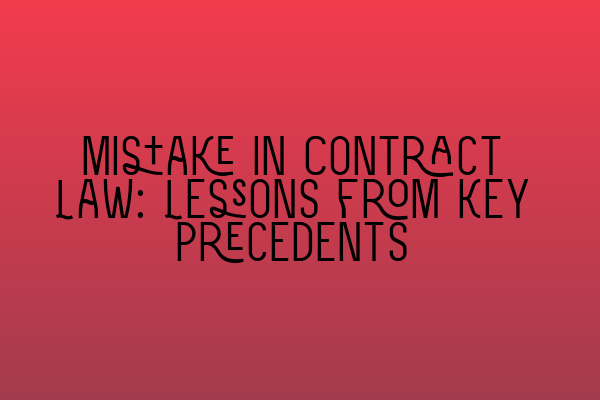Contract law is a complex and nuanced area of legal practice that requires a thorough understanding of its various principles and doctrines. One such principle that we will delve into in this article is the concept of mistake in contract law. Mistake occurs when one or both parties to a contract make an erroneous assumption about a material fact that is essential to the contract. In such cases, the question arises of whether the mistake can render the contract void or voidable.
In order to gain a deeper understanding of mistake in contract law, it is crucial to examine key precedents that have shaped this area of law. These precedents not only provide valuable insights into the legal principles surrounding mistake, but also serve as important guidelines for solicitors and legal professionals representing clients in contract disputes. Let’s explore some of these key cases:
Raffles v. Wichelhaus
One notable case that highlights the implications of mistake in contract law is Raffles v. Wichelhaus. This case dealt with a contract for the sale of cotton, where the parties had different understandings of the identity of the goods. The buyer believed that the contract referred to a shipment of cotton arriving on the ship “Peerless,” while the seller believed it referred to a different shipment arriving on the ship “Peerless,” sailing from a different location. The court found that there was a mutual mistake as to the identity of the goods, rendering the contract void.
This case emphasizes the importance of clear and unambiguous language in contract drafting to avoid misunderstandings. It also highlights the need for parties to ensure that their intentions are properly communicated and agreed upon to avoid the potentially costly consequences of mistaken assumptions.
Great Peace Shipping v. Tsavliris Salvage
Another significant case that sheds light on the principle of mistake in contract law is Great Peace Shipping v. Tsavliris Salvage. In this case, a salvage agreement was entered into between the parties, but one of the parties later discovered that the vessel in distress was not in fact in imminent danger and did not require salvage services. The court held that this mistake rendered the contract voidable, as it was based on a fundamental error of fact that significantly affected the nature of the obligations under the contract.
This case demonstrates that a mistake must relate to a material fact that goes to the root of the contract in order for it to have the potential to render the contract void or voidable. It also highlights the importance of promptly notifying the other party of the mistake in order to preserve one’s rights and mitigate any potential damages.
Smith v. Hughes
Smith v. Hughes is another landmark case that explores the concept of mistake in contract law. In this case, the buyer agreed to purchase a specific type of oats for his horses, but later discovered that the oats were of a different description. The court held that there was no mistake, as the contract was for the purchase of oats suitable for the buyer’s purpose, regardless of their description.
This case underscores the principle that a mistake as to quality or description, unless expressly made a condition of the contract, does not typically render the contract void or voidable. It highlights the importance of considering the intended purpose or use of the goods or services when assessing the impact of a mistake on the validity of a contract.
These key precedents provide essential insights into the concept of mistake in contract law and serve as valuable lessons for solicitors and legal professionals navigating contract disputes. They underscore the need for clear and unambiguous language, effective communication, and a thorough understanding of the material facts surrounding a contract. Mistake can have significant implications on the validity and enforceability of a contract, and thus it is crucial to carefully consider its impact in contract negotiations and drafting.
If you found this article on mistake in contract law informative, you may also be interested in reading these related articles:
- Exploring the Impact of Frustration on Contractual Obligations: Legal Insights
- Interpreting Contractual Clauses: Unlocking the Hidden Meanings
- Legal Aspects of Business Contracts: Key Considerations for Entrepreneurs
- SQE Contract Law vs. Traditional Qualifications: A Comparative Analysis
- Agreements in Contract Law: Understanding Its Various Types
